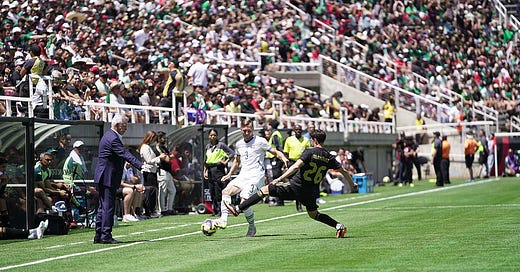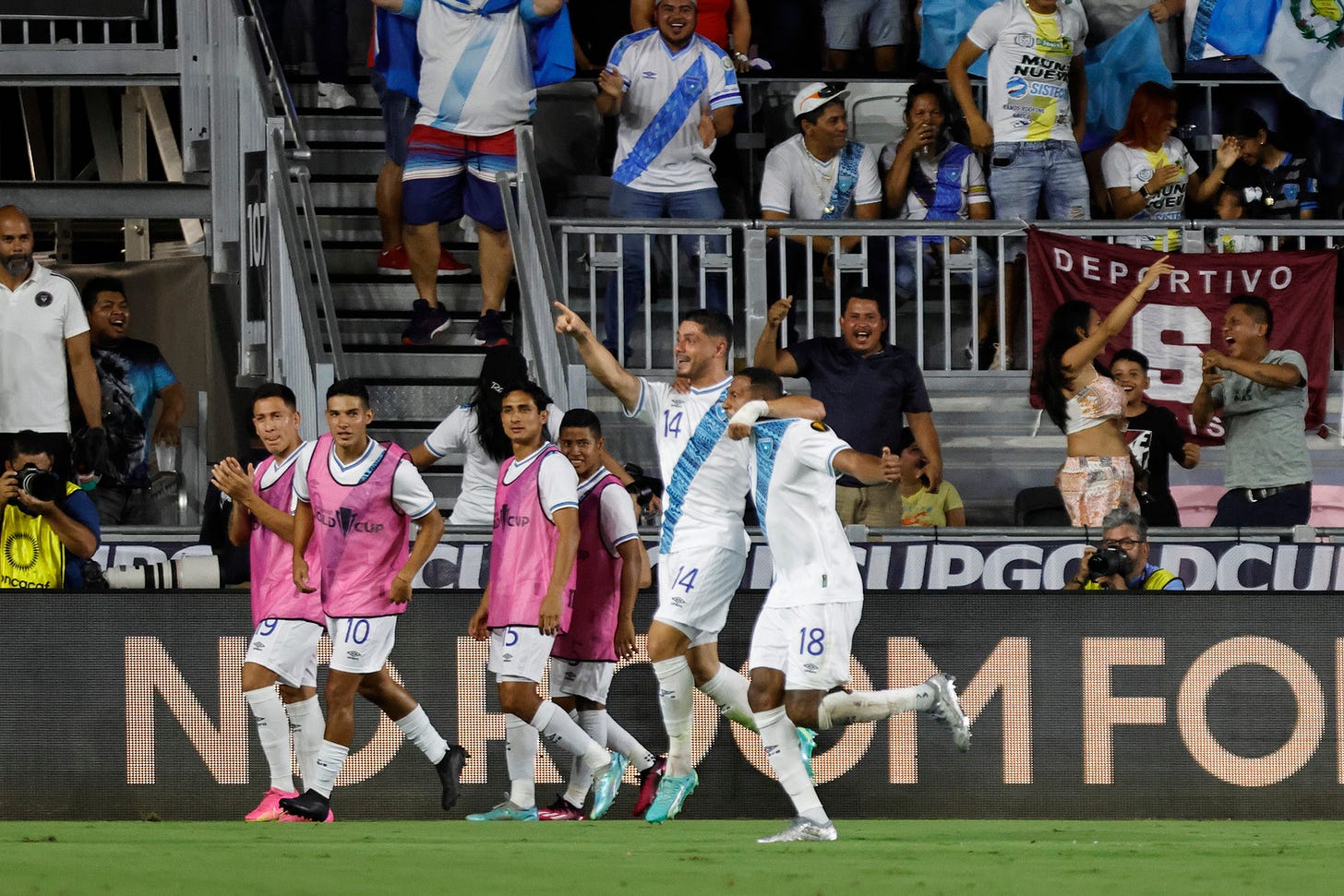🏆 The Gold Cup hasn't started & it's already political
What happens when a country's leaders decide its strength is a weakness
Reporting from Los Angeles
…but not, like, City Hall or anything
The Gold Cup is Concacaf’s most important tournament on the field as the continental championship but, notably, off the field where it is by far the biggest driver revenue the confederation has.
The tournament takes place every two years in the United States, with the confederation leveraging the huge diasporas previously welcomed by the U.S. to fill its stadiums.
Until now, that has been relatively free of controversy. Stadiums full of folks from participating countries pack out stadiums to see their team, get a taste of home and revel in their cultural identity.
But it’s clear this year’s ‘summer of soccer’ will undoubtedly be colored by the political situation in the U.S.
Here in Los Angeles, where the tournament begins Saturday with a match between Mexico and debutants the Dominican Republic, U.S. president Donald Trump deployed thousands of National Guard troops and hundreds of Marines to quell protests - against the wishes of local politicians and a majority of locals living in the area.
The protests started when locals pushed back against raids by officers from Immigration and Customs Enforcement (ICE), going into businesses in both the Fashion District near downtown and farther south in Paramount and Compton to search for undocumented immigrants.
Around town, things seem normal in most areas I’ve visited thus far - though everyone from dental hygienists to baristas agree things seem a little slow. That’s not good news for soccer’s governing bodies.
While Concacaf takes great pains to be seen as non-political, these are moments that can not be ignored by the confederation - or by FIFA as it makes an effort to pull off an expanded Club World Cup it wants to be wildly successful.
Already, Concacaf made a proactive decision, with the Associated Press reporting they worked with the Mexican federation to move the team’s hotel from the downtown LA area where protests continue and a curfew is in place.

Concacaf released a statement Wednesday that both reinforced the fact that the opener will be taking place at SoFi Stadium on Saturday and emphasized that it is keeping in touch with local authorities amidst the protests, troop deployments and other developments.
“Concacaf remains in close and ongoing communication with local authorities, host venues, and the participating national teams regarding the evolving situation in Greater Los Angeles,” the statement read. “The safety and well-being of all participants, fans and stakeholders is the Confederation’s highest priority.
“We will continue to actively monitor developments as we work toward delivering a world-class tournament that highlights the best of our sport in a safe, inclusive, and enjoyable environment for all, starting with the opening match on Saturday, June 14, 2025 in Los Angeles.”
In addition to being morally correct, fostering an inclusive environment is good for business.
A social media post from the Department of Homeland Security said agents would be present, saying in a deleted post that “CBP will be suited and booted and ready to provide security for the first round of games” of the Club World Cup.
Who wants that?
It is not unrealistic to expect a scenario in which attendance to this summer’s tournaments takes a huge dip. As authorities detain, harass and sometimes arrest even people with every legal right to be in the country, why put yourself at risk going to a match?
And how do you put the genie back in the bottle? Even if DHS deleting the post was some sign of contrition or a change of plans, even though the Gold Cup wasn’t mentioned, isn’t every event, something that people should be excited to attend, now tainted with at least the specter of fear?
The scenes at a Gold Cup match are generally a party - not all that different from many of the moments posted on social media during the protests here. People play music, dance, buy food from vendors and enjoy a feeling of community.
If masked law enforcement agents turn up demanding documents from everyone there, it’s not hard to see the situation getting heated or out of control.
Rather than being contained to Los Angeles, protests are spreading across the country. In Texas, where Gold Cup matches will take place in the Dallas, Austin and Houston regions - with Houston’s NRG Stadium hosting the final July 6 - the Republican governor Greg Abbott said he is deploying “5,000+ Texas National Guard soldiers & 2,000+ DPS troopers across Texas to maintain order” at protests planned this weekend in a number of cities across the state.
There have been moments in the past in which Concacaf could’ve been stronger when it comes to assuring its teams be able to participate in U.S.-based tournaments. Haitian teams playing in the U.S. have struggled regardless of which party controls the presidency, with Cavaly AS forced to withdraw from the tournament entirely in 2022.
Cuba, too, has been affected by the United States’ decisions about who can enter the country. The national team was unable to travel to participate in the 2021 Gold Cup.
While the governing bodies can and should be seen as political organizations, getting involved in a specific country’s policies and the enforcement of them is pretty defensible.
Soccer leaders’ good relationship with the current administration may be part of the reason Concacaf even is able to get all its teams into the country for this year’s tournament. Haiti is qualified but is on the list of a dozen countries whose citizens have been blocked entry by Trump. A carve-out in the ban allows athletes taking part in tournaments like the World Cup and Olympics, plus staff and immediate family, to enter. The Gold Cup qualifies as a major event, and the Haitians should, in theory, be able to compete as usual.
Cuba goalkeeper Raiko Arozarena, whose native country is not on Trump’s full ban list but is restricted, returned to the U.S., where he plays his club soccer rather than risk running into complications coming in from Cuba. As a result, Cuba was missing its best shot-stopper in the final match of World Cup qualification, falling to Bermuda and crashing out at the second round.
As the 2026 World Cup approaches, there will, unfortunately, only be more examples. Iran is another banned country, and their team already has qualified for the tournament.
Like it or not, this will continue to be a topic of conversation. Mexico manager Javier Aguirre said he woudn’t talk about what was happening in Los Angeles ahead of a friendly in North Carolina. That’s his right, but he’ll be asked about it again - as will other managers and players taking part in the tournament. It’s a chance to make a statement, even if they don’t want to take that chance.
The United States’ multicultural population is the reason it hosts every Gold Cup. It’s part of the reason FIFA expected the most successful World Cup ever next year.
But the country’s federal government currently sees multiculturalism as a problem it wants to solve rather than a strength. As long as that continues, every aspect of our life will suffer - whether it be a summer soccer tournament, a showcase sporting event or far more serious things like creating community.







Great article! I love the thoughtful perspective